-
ORIGINAL ARTICLE12-04-2023
“Fala-M@no-COVID-19”: technological development of a health navigation program for men during the pandemic
Revista Brasileira de Enfermagem. 2023;76(6):e20220534
Abstract
ORIGINAL ARTICLE“Fala-M@no-COVID-19”: technological development of a health navigation program for men during the pandemic
Revista Brasileira de Enfermagem. 2023;76(6):e20220534
DOI 10.1590/0034-7167-2022-0534
Views0See moreABSTRACT
Objective:
to develop a care-educational technology similar to a health navigation program for men during the COVID-19 pandemic.
Methods:
a methodological and qualitative study of a care-educational technology of health navigation program, structured by Program Development Cycle, with 16 patient navigators and 10 professional navigators. It used reflective thematic content analysis and an adaptation model for data processing.
Results:
the ; navigation program was developed by: I) Observation of reality, problem mapping, needs assessment: content selection, creation of domains and questions; II) Theoretical-conceptual and methodological definition, creation of product under the elaboration of care plans, based on theory, process and taxonomies by a flowchart of operationalization of actions; and III) Self-assessment: qualitative research with professional navigators.
Final considerations:
the technology developed, with theoretical and methodological support, allowed to derive a viable navigation program compatible with reality based on the audience’s needs.
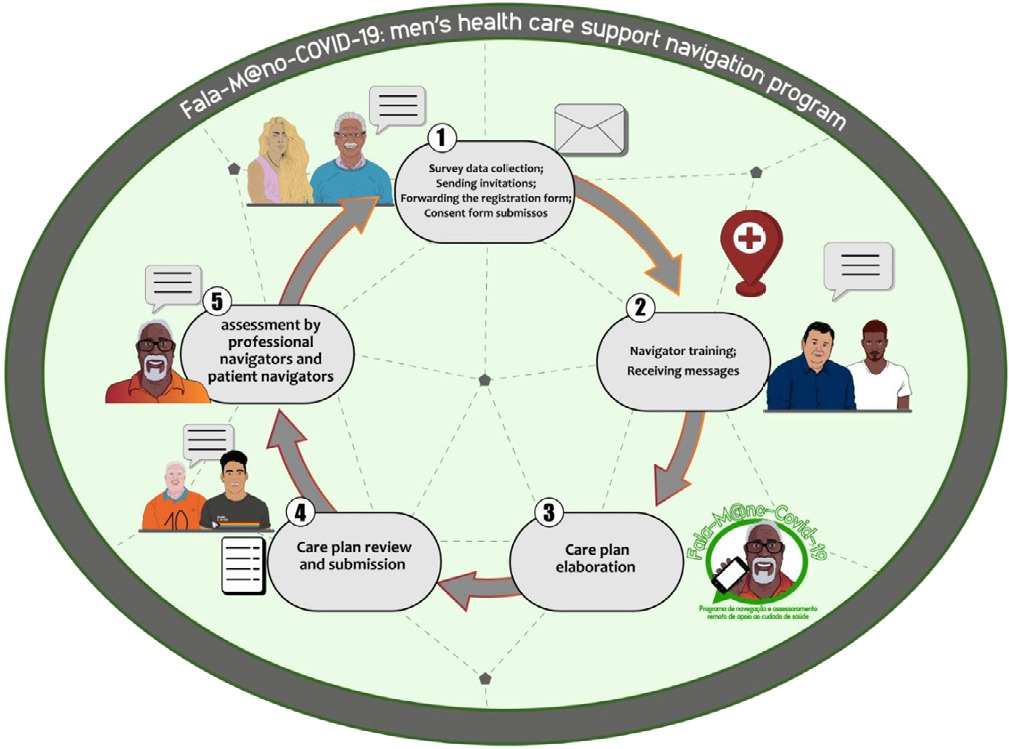
-
ORIGINAL ARTICLE12-04-2023
Social representation of young people in higher education about sexually transmitted infections
Revista Brasileira de Enfermagem. 2023;76(6):e20220406
Abstract
ORIGINAL ARTICLESocial representation of young people in higher education about sexually transmitted infections
Revista Brasileira de Enfermagem. 2023;76(6):e20220406
DOI 10.1590/0034-7167-2022-0406
Views0See moreABSTRACT
Objective:
to analyze the social representations about sexually transmitted infections elaborated by undergraduate students.
Methods:
a descriptive, qualitative study, in the light of the structural approach of Social Representation Theory, carried out with 160 young undergraduate students, in the second half of 2019, in the city of Rio de Janeiro. Data were collected using a sociodemographic characterization questionnaire, knowledge and practices for preventing sexually transmitted infections, analyzed using descriptive statistics and a form of free evocations with the inducing term STD, analyzed using prototypical and similarity analysis.
Results:
the representation’s possible central nucleus is composed of lexicons aids, disease and HIV; the peripheral system by syphilis, sex, condoms, gonorrhea, prevention, infection, carelessness, HPV, herpes, ignorance, treatment, fear, unprotected-sex and danger.
Final considerations:
social thinking about sexually transmitted infections is characterized by their recognition as diseases, which require barrier prevention measures, associating with unsafe sexual practices that arouse fear.

-
12-04-2023
The Medical Healing of Souls: a strategy for welcoming post-pandemic mental health
Revista Brasileira de Enfermagem. 2023;76(6):e20220331
Abstract
The Medical Healing of Souls: a strategy for welcoming post-pandemic mental health
Revista Brasileira de Enfermagem. 2023;76(6):e20220331
DOI 10.1590/0034-7167-2022-0331
Views0See moreABSTRACT
Objective:
to reflect on the applicability of the Medical Healing of Souls (MHS) by health professionals as a welcoming strategy in post-pandemic mental health.
Methods:
a theoretical and reflective study, based on Viktor Frankl’s philosophy, based on the book “The Doctor and the Soul, From Psychotherapy to Logotherapy” and scientific literature.
Results:
the study was structured in two discursive approaches: MHS in the field of health; The applicability of MHS in post-pandemic mental health care.
Final considerations:
MHS can be used in mental health care, in health emergencies, promoting a more humane performance of health professionals, facilitating the integration of inevitable suffering into a meaningful life.
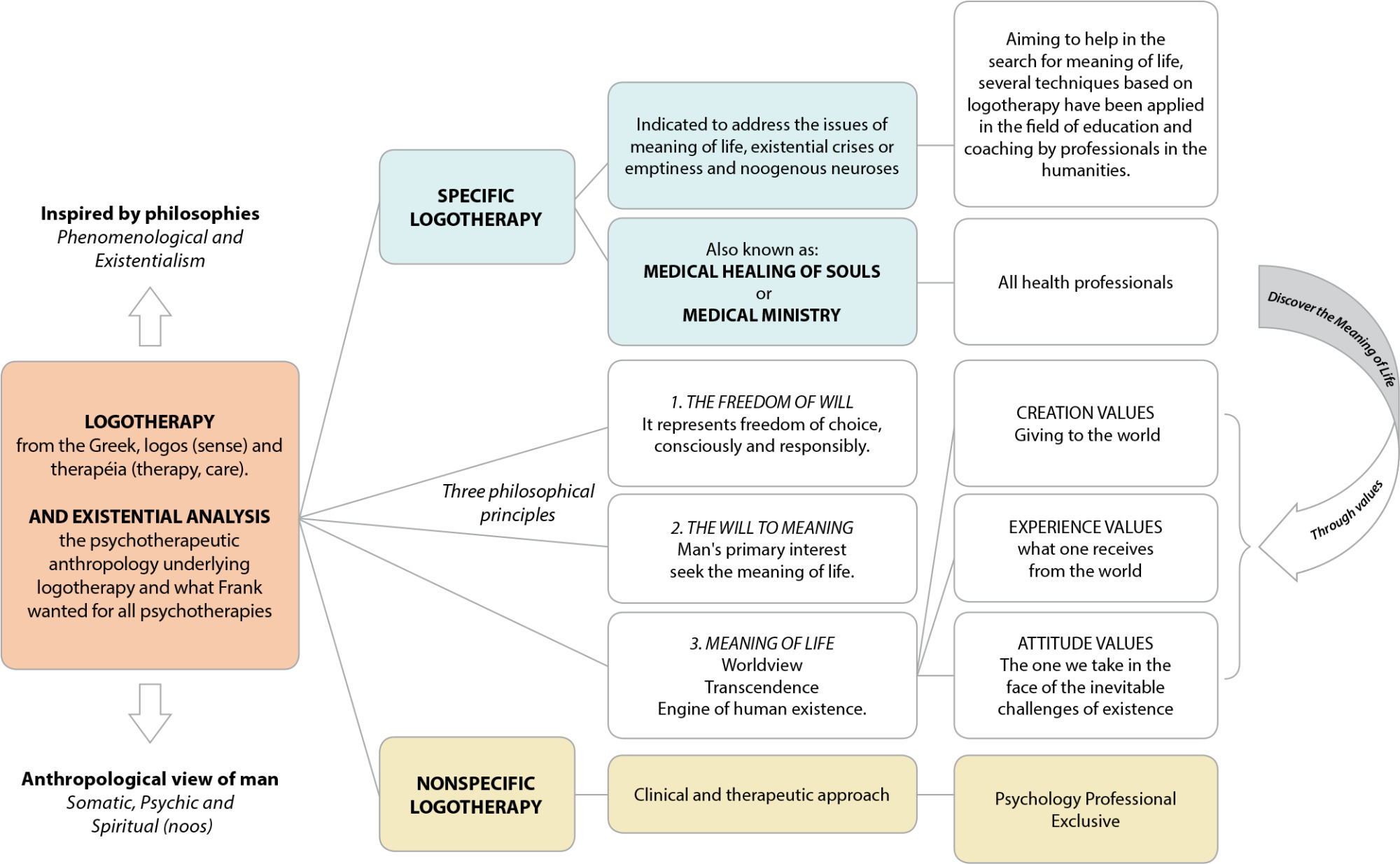
-
ORIGINAL ARTICLE12-04-2023
Translation, cross-cultural adaptation and validity study of the “Play Nicely Program: The Healthy Discipline Handbook” for use in Brazil
Revista Brasileira de Enfermagem. 2023;76(6):e20220281
Abstract
ORIGINAL ARTICLETranslation, cross-cultural adaptation and validity study of the “Play Nicely Program: The Healthy Discipline Handbook” for use in Brazil
Revista Brasileira de Enfermagem. 2023;76(6):e20220281
DOI 10.1590/0034-7167-2022-0281
Views0See moreABSTRACT
Objective:
to describe the translation, cross-cultural adaptation and validity process of the “Play Nicely Program: The Healthy Discipline Handbook” for use in Brazil.
Methods:
a methodological study that followed the translation, back-translation, expert committee assessment, and pre-test steps. The Content Validity Index (CVI) was calculated for both the judge population and the pre-test population. Four translators, seven expert judges in the field of child health and thirty participants in the pre-test, including parents, teachers and healthcare professionals, participated in the study.
Results:
in experts’ analysis (98.4%), a value of 100% of adequate assessments was obtained, and in the target population’s analysis (89.5%), there were 100% of adequate assessments. In both analyses, suggested adaptations were made.
Conclusios:
cross-cultural adaptation and content validity into Brazilian Portuguese of the “Play Nicely Program: The Healthy Discipline Handbook” were considered adequate for application in the target population.

-
ORIGINAL ARTICLE12-04-2023
Assessment of the components of sarcopenia and quality of life perceived of individuals on hemodialysis
Revista Brasileira de Enfermagem. 2023;76(6):e20220677
Abstract
ORIGINAL ARTICLEAssessment of the components of sarcopenia and quality of life perceived of individuals on hemodialysis
Revista Brasileira de Enfermagem. 2023;76(6):e20220677
DOI 10.1590/0034-7167-2022-0677
Views1See moreABSTRACT
Objectives:
to evaluate the prevalence of sarcopenia in individuals aged 50 years or older on hemodialysis; to verify the association between sarcopenia and sociodemographic, clinical, anthropometric factors, components of sarcopenia and quality of life (QoL); and to correlate the components of sarcopenia with QoL.
Methods:
Participated 83 individuals on hemodialysis. Sarcopenia was established according to the current European consensus. Dynamometry to determine strength, calf circumference (CC) and appendicular skeletal muscle mass index (ASMMI) to obtain muscle mass and gait speed (GS) for physical performance. For QoL used the WHOQOL-bref.
Results:
the prevalence of sarcopenia was 32.6% (CC) and 18.1% (ASMMI). There was no association between sarcopenia and QoL. Both handgrip strength (r=0.25) and GS (r=0.36) showed a correlation with physical domain.
Conclusions:
sarcopenia was expressive, and the aspects of functionality determine the physical impairment in this population.
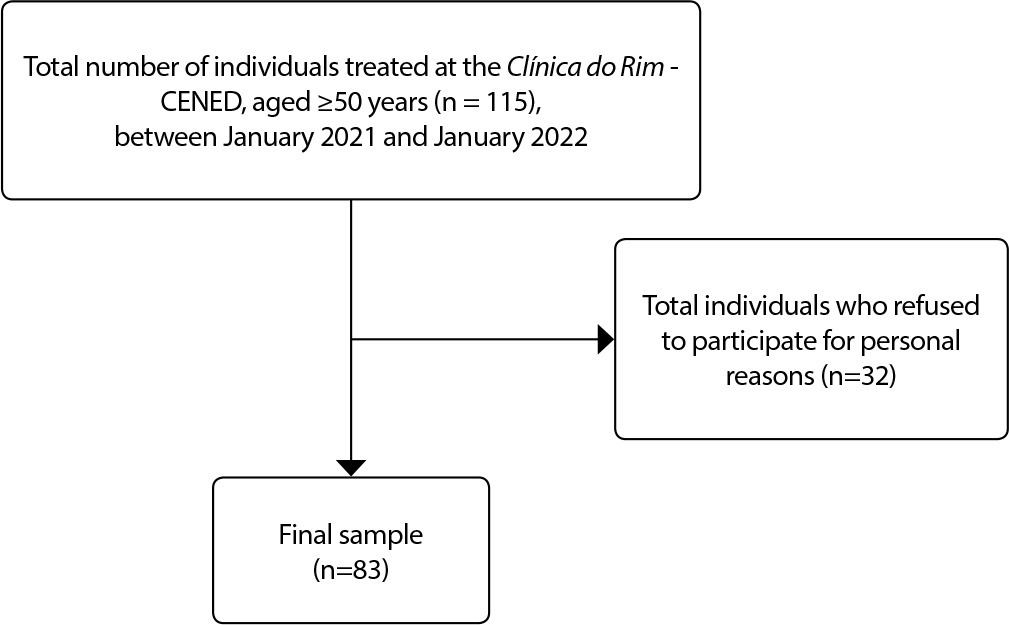
-
ORIGINAL ARTICLE12-04-2023
Effects of auriculotherapy on anxiety and biomarkers in Primary Health Care: a clinical trial
Revista Brasileira de Enfermagem. 2023;76(6):e20220728
Abstract
ORIGINAL ARTICLEEffects of auriculotherapy on anxiety and biomarkers in Primary Health Care: a clinical trial
Revista Brasileira de Enfermagem. 2023;76(6):e20220728
DOI 10.1590/0034-7167-2022-0728pt
Views0See moreABSTRACT
Objective:
to assess the effects of auriculotherapy on anxiety and brain-derived neurotrophic factor (BDNF), neuron-specific enolase (NSE) and S100 calcium-binding protein B (S100B) serum levels in adults assisted in Primary Health Care.
Methods:
a pre-experimental pilot clinical trial. Information was obtained from 19 patients using the State-Trait Anxiety Inventory (STAI) and analysis of BDNF, NSE and S100B serum levels.
Results:
the pre-intervention anxiety score in the IDATE-Trait was 52.11±6.691 (CV 12.84%) and the assessment after auriculotherapy was significantly lower (43.72±8.141; CV 18.62%; P=0.0007). S100B levels were significantly reduced after auriculotherapy (from 64.03±72.18 to 54.03±68.53 pg/mL; CV 126.8%; P=0.0023).
Conclusion:
auriculotherapy effectively reduced anxiety levels. It proved to be safe and easy to apply, allowing nurses to perform this technique autonomously. A reduction of S100B was also evidenced, demonstrating possible prevention of neuronal damage.
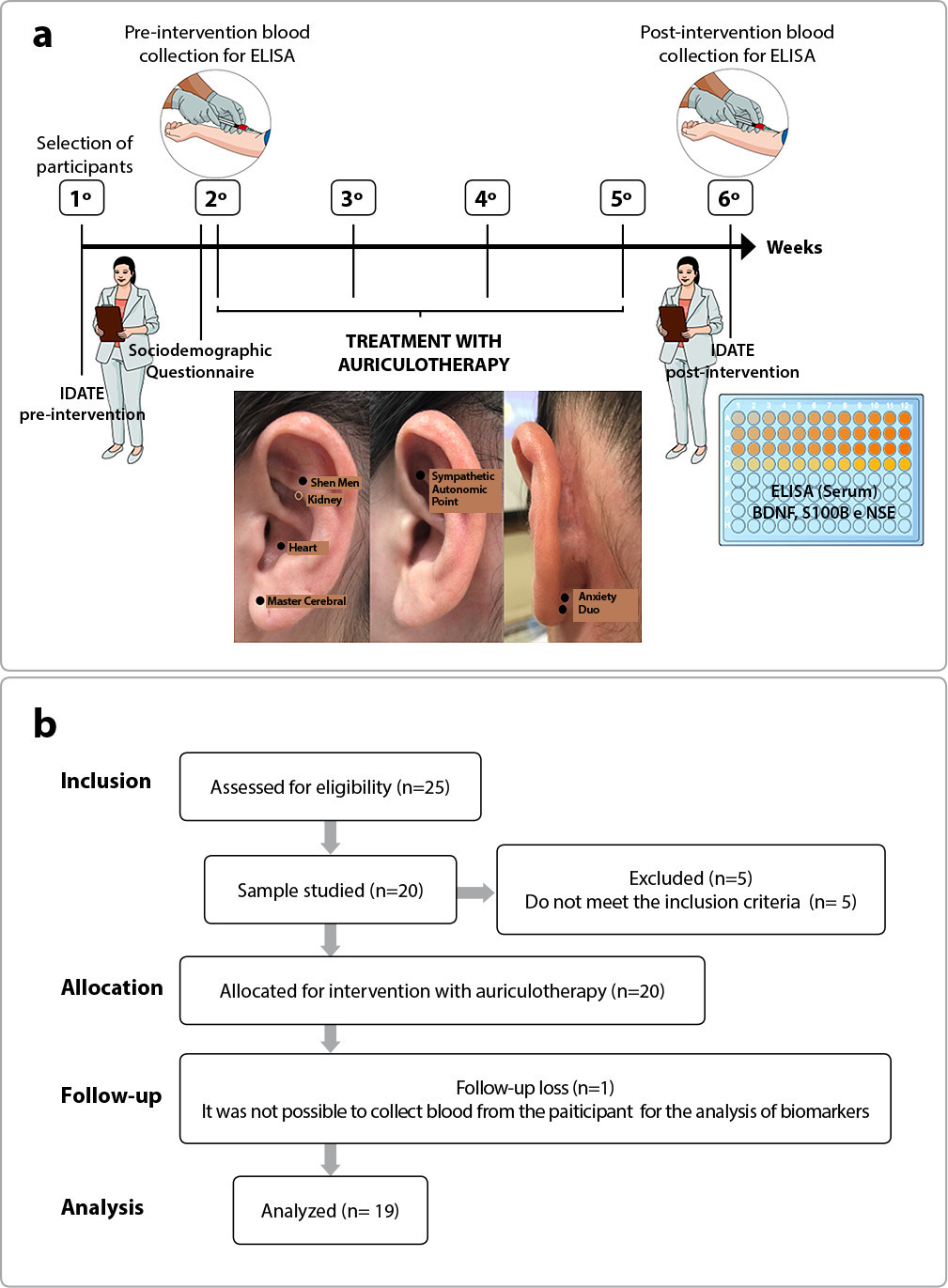
-
ORIGINAL ARTICLE12-04-2023
Leadership Competencies of the Medical-Surgical Nursing Specialist Nurse
Revista Brasileira de Enfermagem. 2023;76(6):e20220721
Abstract
ORIGINAL ARTICLELeadership Competencies of the Medical-Surgical Nursing Specialist Nurse
Revista Brasileira de Enfermagem. 2023;76(6):e20220721
DOI 10.1590/0034-7167-2022-0721
Views0See moreABSTRACT
Objective:
To identify the leadership competencies of Medical-Surgical Nursing Specialist Nurses.
Methods:
A quantitative, descriptive study using the Leadership Competencies Questionnaire. 311 Portuguese Medical-Surgical Nursing Specialist Nurses participated. Data analysis involved descriptive and inferential statistical analysis using the Statistical Package for Social Sciences (SPSS), version 22.0.
Results:
Study participants had an above-average self-perception on the scale (mean = 3.5) in all leadership roles, recognizing their leadership competencies. The leadership competencies of Medical-Surgical Nursing Specialist Nurses are balanced across all roles: Mentor (5.80 ± 1.02); Coordinator (5.53 ± 0.86); Facilitator (5.38 ± 1.04); Innovator (5.34 ± 0.88); Director (5.31 ± 1.10); Producer (5.30 ± 0.98); Monitor (5.15 ± 1.00); Corrector (4.79 ± 1.29)
Conclusions:
Specialized nursing practice enhances nurses’ self-perceived leadership competencies. Nurses see themselves as leaders focused on internal support and facilitation of collective effort and opportunities for skill development.
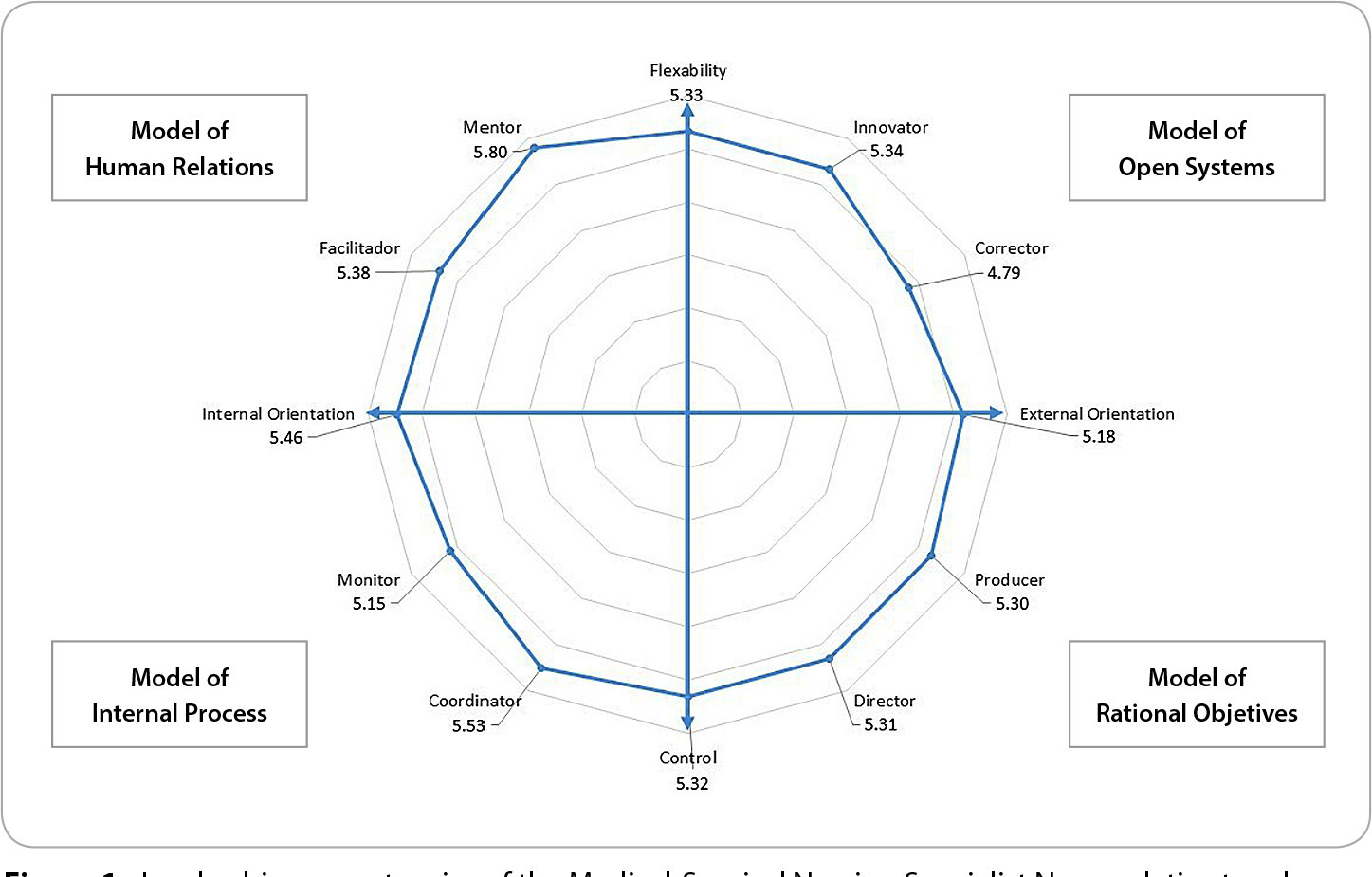
-
ORIGINAL ARTICLE12-04-2023
Feelings about birth by a group of high-risk pregnant women
Revista Brasileira de Enfermagem. 2023;76(6):e20230059
Abstract
ORIGINAL ARTICLEFeelings about birth by a group of high-risk pregnant women
Revista Brasileira de Enfermagem. 2023;76(6):e20230059
DOI 10.1590/0034-7167-2023-0059
Views0See moreABSTRACT
Objective:
to understand feelings about birth among a group of high-risk pregnant women.
Method:
a descriptive and qualitative study, using Alfred Schütz’s social phenomenology as a philosophical theoretical framework. The study included 25 pregnant women undergoing high-risk prenatal care. The interview had the following guiding questions: tell me about your feelings regarding the moment of birth/childbirth; How do you deal with the high-risk diagnosis? What are your expectations for birth/childbirth?
Results:
five categories emerged: Fear of obstetric care; Fear of complications with the baby; Fear of cesarean section; Resilience in the face of high-risk pregnancy; and Expectations for birth.
Considerations:
high-risk pregnant women are afraid of the care they will receive, the risks and concern about the baby’s vitality at birth. The importance of care is emphasized, with a welcoming environment, bonding and communication between health team and pregnant woman.
-
EXPERIENCE REPORT07-31-2020
(In)visibility of children with special health needs and their families in primary care
Revista Brasileira de Enfermagem. 2020;73:e20190071
Abstract
EXPERIENCE REPORT(In)visibility of children with special health needs and their families in primary care
Revista Brasileira de Enfermagem. 2020;73:e20190071
DOI 10.1590/0034-7167-2019-0071
Views0See moreABSTRACT
Objectives:
to discuss the (in)visibility of children with special healthcare needs and their families in the Primary Health Care scenario.
Methods:
experience report about the difficulties faced by researchers from different regions of Brazil to locate children with special healthcare needs in the scope of primary care.
Results:
the main reason for these children and their families to be “unknown” and, therefore, not assisted in PHC, is the fact that they are followed-up by institutions/outpatient clinics and specialized and/or public rehabilitation clinics, or even because they have private health insurance.
Final Considerations:
transferring care responsibility to the Primary Health Care teams to specialized and rehabilitation institutions may be related to the lack of knowledge of the care demands of this group, as well as to the relevance of care centered on rehabilitation and the specialty instead of the long-term care, one of the features of primary health care.
-
ORIGINAL ARTICLE03-30-2020
Professional skills for health promotion in caring for tuberculosis patients
Revista Brasileira de Enfermagem. 2020;73(2):e20180943
Abstract
ORIGINAL ARTICLEProfessional skills for health promotion in caring for tuberculosis patients
Revista Brasileira de Enfermagem. 2020;73(2):e20180943
DOI 10.1590/0034-7167-2018-0943
Views0See moreABSTRACT
Objectives:
to understand the health promotion skills found in the speeches of health practitioners in care for TB patients.
Methods:
qualitative study, developed with seven practitioners involved in care for TB patients, identified from a sociocentric approach, whose speeches were submitted to analysis based on the health promotion skills model in the Galway Consensus.
Results:
there were four domains: Catalyzing change; Leadership; Planning; and Partnerships. These domains resulted from health education actions, contribution of management nursing practitioners, seeking to meet patients’ needs and articulation of professional sectors.
Final considerations:
there were some skill domains in the speeches of health practitioners, with the nurse being quoted in the development of essential skills for health promotion activities, such as catalyzing change and leading care for TB patients.
-
REVIEW09-19-2022
Authentic leadership in the educational system and in nursing education: an integrative review
Revista Brasileira de Enfermagem. 2022;75(1):e20220122
Abstract
REVIEWAuthentic leadership in the educational system and in nursing education: an integrative review
Revista Brasileira de Enfermagem. 2022;75(1):e20220122
DOI 10.1590/0034-7167-2022-0122
Views0See moreABSTRACT
Objectives:
to identify and analyze the knowledge produced in literature about authentic leadership in the educational system, as well as in nursing education.
Methods:
an integrative review, carried out in the Scopus, Web of Science, CINAHL, MEDLINE/PubMed, ERIC, LILACS databases. Articles that addressed authentic leadership in the educational system from a general perspective and within the nursing scope, as well as teaching practices of this leadership model, were eligible.
Results:
twenty-three articles met the inclusion criteria, most published in 2019, highlighting studies in the context of teaching, with a predominance in the nursing course and which were synthesized into three thematic categories.
Final Considerations:
it was found that the higher the levels of authentic leadership in the educational system, the higher the rates of other positive factors related to it, such as trust, involvement, academic optimism, responsibility, creativity, among others.

-
ORIGINAL ARTICLE12-07-2020
Construction and validation of an educational gerontotechnology on frailty in elderly people
Revista Brasileira de Enfermagem. 2020;73:e20200800
Abstract
ORIGINAL ARTICLEConstruction and validation of an educational gerontotechnology on frailty in elderly people
Revista Brasileira de Enfermagem. 2020;73:e20200800
DOI 10.1590/0034-7167-2020-0800
Views0See moreABSTRACT
Objective:
to construct and validate an educational gerontechnology on frailty in elderly people.
Method:
a methodological study developed in three stages: educational video construction, validation by expert judges and elderly people. Validation was carried out by 22 judges and 22 elderly people. Educational Content Validation Instrument was used for judges and questions adapted from the Suitability Assessment of Materials questionnaire for elderly people. For validation, agreement criterion greater than 80% was considered, verified using Content Validation Index and binomial test.
Results:
the video addresses recommendations for elderly people at risk of frailty and health-promoting habits, using cordel literature. An agreement greater than 80% was verified in all items assessed by judges and the target audience.
Conclusion:
the video proved to be valid in terms of content and appearance by judges and elderly people, with the potential to mediate health-promoting educational practices in healthy aging.

-
ORIGINAL ARTICLE10-01-2022
Self-care of elderly people with diabetes mellitus and the nurse-patient interpersonal relationship
Revista Brasileira de Enfermagem. 2022;75(1):e20201257
Abstract
ORIGINAL ARTICLESelf-care of elderly people with diabetes mellitus and the nurse-patient interpersonal relationship
Revista Brasileira de Enfermagem. 2022;75(1):e20201257
DOI 10.1590/0034-7167-2020-1257
Views1INTRODUCTIONChronic non-communicable diseases are the main causes of death and health problems in the world, causing about 41 million deaths each year, which corresponds to approximately 71% of all deaths. Among these diseases, diabetes mellitus has stood out due to the increase in its incidence and prevalence().Estimates indicate that 463 million people live with diabetes […]See more -
01-27-2020
Comparison of Interpretive Description and Qualitative Description in the Nursing Scope
Revista Brasileira de Enfermagem. 2020;73(1):e20190339
Abstract
Comparison of Interpretive Description and Qualitative Description in the Nursing Scope
Revista Brasileira de Enfermagem. 2020;73(1):e20190339
DOI 10.1590/0034-7167-2019-0339
Views0Interpretive Description BasisID is a small scale qualitative research about a phenomenon regarded in the field that aims to extract themes and patterns. This approach begins with the critical analysis of clinical and theoretical knowledge in the field. It develops the initial conceptual framework, however it does not enter procedures details. Instead, this approach explains […]See more -
REVIEW07-09-2021
Nursing care for patients in post-transplantation of hematopoietic stem cells: an integrative review
Revista Brasileira de Enfermagem. 2021;74(3):e20200097
Abstract
REVIEWNursing care for patients in post-transplantation of hematopoietic stem cells: an integrative review
Revista Brasileira de Enfermagem. 2021;74(3):e20200097
DOI 10.1590/0034-7167-2020-0097
Views0See moreABSTRACT
Objectives:
to analyze the available evidence on the nursing care provided to patients after hematopoietic stem cell transplantation.
Methods:
integrative review with the search for primary studies in four databases and a virtual health library. A broad search strategy was used, including research published in English, Brazilian Portuguese, or Spanish, between 2008 and 2018, totaling a sample of 42 studies.
Results:
the studies were grouped into three categories: multiple nursing care (n=19), first-line care (n=18), and self-management of care (n=5).
Conclusions:
nursing care is critical, comprising patients’ physical, psychological and social aspects. It occurs in hospital and home contexts, mainly involving technical actions and health guidance. The evidence identified provide subsidies for decision-making; however, most studies are of the non-experimental type, indicating the need for conducting intervention research.

-
ORIGINAL ARTICLE08-18-2021
Mapping of advanced practice nursing actions in the Family Health Strategy
Revista Brasileira de Enfermagem. 2021;74:e20210228
Abstract
ORIGINAL ARTICLEMapping of advanced practice nursing actions in the Family Health Strategy
Revista Brasileira de Enfermagem. 2021;74:e20210228
DOI 10.1590/0034-7167-2021-0228
Views0See moreABSTRACT
Objectives:
to map advanced practice nursing actions implemented in the Family Health Strategy context.
Methods:
cross-sectional exploratory study carried out with Family Health Strategy nurses. Data obtained in the mapping were compared to the characteristics that define advanced practice nurses and are adopted internationally by using a checklist based on the International Council of Nurses Guidelines.
Results:
the mapping allowed to identify advanced practice nursing actions, such as advanced assessment, judgement, decision-making, and diagnostic reasoning skills and authority to diagnose and prescribe medications, diagnostic testing, and therapeutic treatments. However, evidence found in the educational preparation domain indicated evident fragility, expressed as the low percentage of nurses credentialed with a professional master’s degree.
Conclusions:
the present study showed that nurses in the Family Health Strategy carry out advanced practice nursing actions without the professional master’s degree recommended for credentialing, with pertinent legislation, which requires initiatives to be taken by nursing leaders to overcome this deficiency.
Search
Search in:
Nuvem de Tags
Adolescente (85) Atenção Primária à Saúde (239) COVID-19 (91) Criança (91) Cuidados de Enfermagem (269) Educação em Enfermagem (151) Educação em Saúde (139) Enfermagem (930) Enfermagem Pediátrica (86) Estudantes de Enfermagem (77) Estudos de Validação (131) Família (87) Idoso (208) Promoção da Saúde (99) Qualidade de Vida (104) Saúde do Trabalhador (86) Saúde Mental (145) Saúde Pública (82) Segurança do Paciente (150) Tecnologia Educacional (100)



